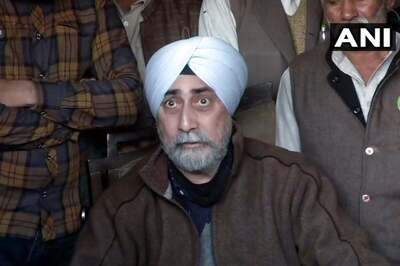
views
London: The Irish government has said it will make a decision before the year-end about the country's tough abortion laws, weeks after Indian dentist Savita Halappanavar died after she was refused termination of her pregnancy despite miscarrying.
The government on Tuesday published the report of an expert group, which was appointed to provide options for dealing with the European Court of Human Rights judgement that pregnant Irish women need certainty about legal abortion rights in Ireland.
The report, which was brought before the Cabinet by Minister for Health James Reilly, sets out a number of options for the government "to implement the European Court of Human Rights judgment ... and the requirements of the Constitution."
The development comes amid raging controversy over the death of 31-year-old Savita from blood poisoning at the Galway University Hospital on October 28 after doctors refused to terminate her 17-week pregnancy, stating "this is a Catholic country".
The expert group was established to advise the government how to respond to the court's decision in 2010 that Ireland had failed to properly implement the constitutional right to life of the mother set out by the Supreme Court in the 1992 'X' case.
Speaking after the publication of the report, Reilly said the government will make a decision before the end of next month on which of the options to implement. Reilly said the Cabinet decided at its meeting to publish the report and have it debated in the Parliament.
He said there would be three days of hearings at a health committee in early January before the Parliament resumes. "And then we will seek to implement through legislation the decision of the government as quickly as possible." Reilly went on to say that his reference to "legislation" was a "slip of the tongue".
He said he did not want to preempt the debate in the Parliament and the decision of the Cabinet. "I'm confirming that the government decision will be made on this before the end of December and implemented in the early new year."
The Parliament will begin debating a motion from the Technical Group on abortion legislation this week. The four options outlined in the expert group report included 'Non-Statutory Guidelines' and 'Statutory
Regulations' on "the provision of lawful termination of pregnancy by way of primary legislation to empower the Minister for Health to regulate the area by statutory instrument".
The third option is 'Legislation Alone': "Regulate the provision of lawful termination of pregnancy by way of primary legislation"; and the fourth one is 'Legislation plus Regulations': "Regulate the provision of lawful termination of pregnancy by way of primary legislation, with certain matters left to the Minister for Health to regulate by way of secondary legislation."
According to the report, the first option "would meet the need for speedy action" but, on the other hand, "guidelines are, by their nature, non-binding and do not have force of law." The report comments: "The fact that the measures would not have binding force is likely to mean that this option would not satisfy the Committee of Ministers of the Council of Europe."
Under Option 2, the Minister for Health would issue regulations, based on enabling legislation passed by the Parliament. The report lists several advantages of this option, such as the fact that the regulations could be amended relatively easily, and only one disadvantage, namely, that passing legislation takes a considerable amount of time.
In relation to Option 3, Legislation Alone, the report says: "In this option, all the details on the assessment of entitlement to a lawful termination of pregnancy would be enacted in legislation, giving the Oireachtas (Parliament) the power to scrutinise all its provisions and leaving no significant matters to be dealt with by regulations."
It also lists a number of advantages with this approach. However, the expert group cautions that it "might be too rigid an approach," noting that "even minor changes that might arise following implementation or in light of scientific advances would require full scrutiny and further passage through the Houses of the Oireachtas."
On Option 4, Legislation plus Regulations, the report states: "The advantages of this option are that it fulfils the requirements of the judgement, it provides for appropriate checks and balances between the powers of the legislature and the executive, and would be amenable to changes that might arise out of clinical practice and scientific advances."
Prime Minister Enda Kenny on Tuesday insisted the government was united on the issue of abortion legislation. He said the matter requires careful, calm and sympathetic consideration. "We're not going to leave this hanging on interminably," he said. "I'd like to deal with this as quickly and as comprehensively (as) it's practical to do so. Don't ask me for a specific date, but it's not going to be left hanging around."
Following the publication of the expert group report, the Choice Ireland organisation called on the Government to "act immediately on the options set out".
Spokeswoman Stephanie Lord said it was "obvious" the government was "left with no option now but to legislate to provide lawful abortions for women where they have life threatening conditions". "The government did not need an expert group to tell them this but now that they have, it should be acted on immediately."


















Comments
0 comment